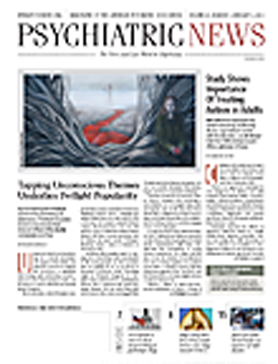More Depression Screening Urged for Pregnant Women, New Mothers
Increased screening of pregnant women and new mothers for major depression and conflicts with intimate partners may help identify women at risk for suicide, a University of Michigan Health System–led analysis of federal data has concluded.
The study analyzed five years of suicide data from the National Violent Death Reporting System and is reported in General Hospital Psychiatry. Only a small percentage of women who take their own lives are pregnant or have recently given birth, but their frequent interactions with the health care system provide important opportunities for clinicians to intervene if risk factors are better understood, the researchers said. Among their findings: pregnant and postpartum women had a much higher incidence of conflicts with intimate partners than their peers, and Hispanic women were more likely than those of other ethnic groups to take their own lives when pregnant or soon after giving birth.
K, Singh V, Marcus S, et al. “Mental Health, Substance Use, and Intimate Partner Problems Among Pregnant and Postpartum Suicide Victims in the National Violent Death Reporting System. 2011.” Gen Hosp Psychiatry. Nov 4 [Epub ahead of print]. www.ncbi.nlm.nih.gov/pubmed/22055329 Childhood Intelligence Linked to Illegal Drug Use
Although recent reports have linked high childhood IQ scores with excess alcohol intake and alcohol dependence in adult life, the relationship with illegal drug use in later life is relatively unknown. Researchers at Cardiff University in the United Kingdom and University College London, examined this relationship using data from the 1970 British Cohort Study, an ongoing longitudinal study of children born in Great Britain between April 5 and 11, 1970.
A total of 16,571 babies born in England, Scotland, and Wales were enrolled at birth and were followed up at ages 5, 10, 16, 26, and 29 to 30. At age 16, they were queried about drug use and psychological distress; at age 29 or 30, they were again queried about drug use.
Final analyses of the data, reported in the Journal of Epidemiology and Community Health, indicated that children with a higher IQ were more likely to use illegal drugs in adolescence as well as in adulthood. These findings were independent of the effects of parents’ social class, experiencing significant psychological distress during adolescence, and adult socioeconomic advantage. In the analyses of drug use at age 30, associations with IQ at ages 5 and 10 were stronger among women than men.
While the researchers discussed theories for the observed association, they cautioned, “Potential pathways linking high childhood IQ with later illegal drug misuse are likely to be varied and require further exploration.”
White J and Batty G. Intelligence Across Childhood in Relation to Illegal Drug Use in Adulthood: 1970 British Cohort Study. 2011. J Epidemiol Community Health. Nov 14 [Epub ahead of print]. www.ncbi.nlm.nih.gov/pubmed/22086967 Suicide, Smoking, and Familial Influence
Smoking and nicotine dependence are correlated with suicidal behavior, and several possible explanations for the association have been proposed.
Researchers at the Midwest Alcoholism Research Center at the Washington University School of Medicine in St. Louis recently sought to clarify the mechanisms for the lifetime co-occurrence of smoking and suicide by testing whether familial vulnerability may account for this association.
Participants were offspring of male twins from the Vietnam Era Twin Registry, a national registry of monozygotic and dizygotic twin pairs who served in the military during the Vietnam War era (1965 to 1975). The study involved analyses of data collected during a 1992 administration of the Diagnostic Interview Schedule to twin fathers and from diagnostic telephone interviews in two complementary offspring-of-twins projects.
In the cohort of 1,919 male and female offspring, the researchers observed that smoking and nicotine dependence were correlated with suicidal behavior, and familial risk did not significantly alter that association. “The present design provides some of the strongest evidence to date that ever having smoked, regular smoking, and nicotine dependence are all independent correlates of suicidal behavior above the influence of familial vulnerability,” concluded the researchers in their report in the journal Nicotine and Tobacco Research.
Scherrer J, Grant J, Agrawal A, et al. Suicidal Behavior, Smoking, and Familial Vulnerability. 2011. Nicotine Tob Res. Nov 11 [Epub ahead of print]. www.ncbi.nlm.nih.gov/pubmed/22080587 



